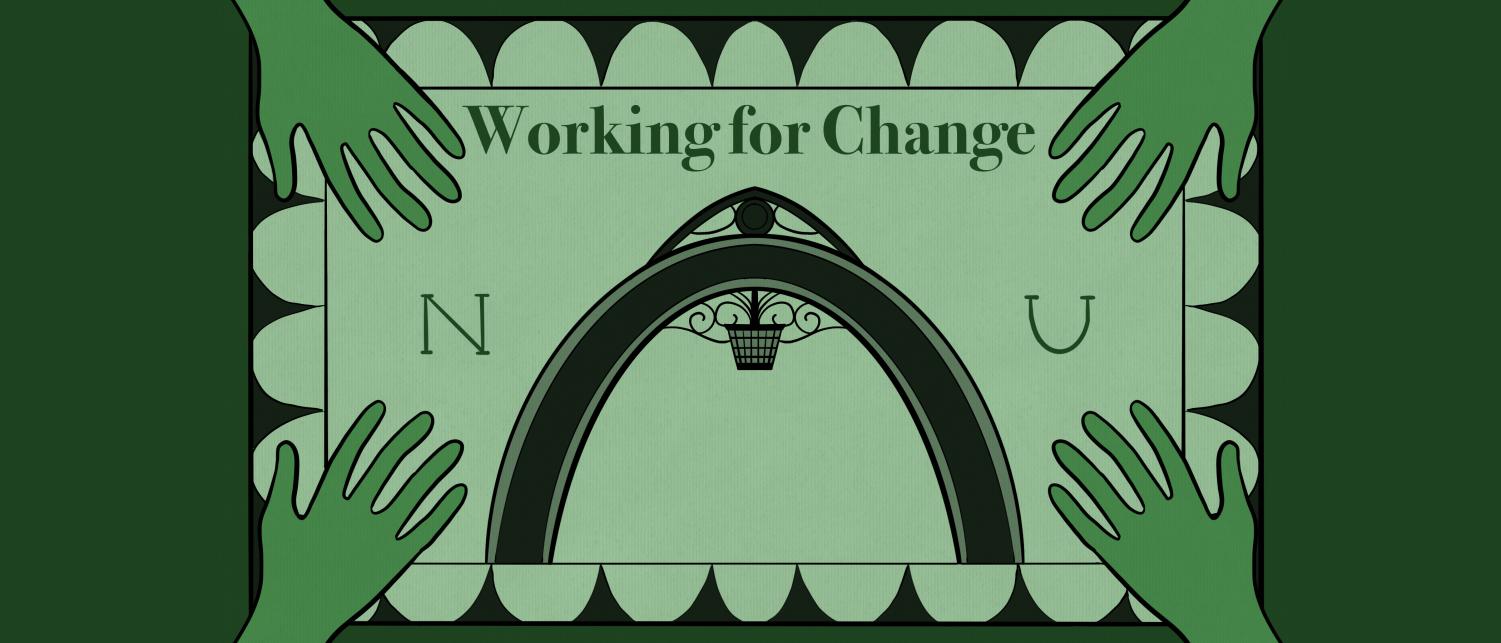In Focus: As workers across the country tackle pandemic-related obstacles, Northwestern’s labor force continues to clash with the University over unionization efforts
February 25, 2022
About 50 people marched from The Rock to the Provost’s Office on Oct. 12, 2021 as Northwestern’s library workers prepared to deliver a list of demands to administrators. Community members, including advocates involved in Northwestern University Graduate Workers and Students Organizing for Labor Rights, accompanied the library workers in support.
The workers climbed the stairs to the Provost’s Office and waited. They weren’t allowed in, but some gave impromptu speeches sharing their experiences and emphasizing the strength and solidarity of the union they were fighting to form. After more than a year of pandemic-related financial strains, they were coming together to stand up for their rights.
Shortly after their arrival, a delegate from the office accepted the workers’ letter with a promise to deliver it to Provost Kathleen Hagerty. Energy rippled through the crowd. The library workers were excited to begin the formal process of unionization and gain agency over University decisions that affected their livelihoods.
NU Library Workers Union is not the only group of organized workers on campus to clash with the administration. NUGW and NU’s dining and service workers also continue to face opposition.
Represented by UNITE HERE Local 1, a union that supports more than 15,000 hospitality workers in Chicago and Northwest Indiana, NU dining and service workers concluded more than two years of contract negotiations in October 2021.
Although the University has voiced support for employees’ right to unionize, some workers’ experiences tell a different story. SESP junior Neva Legallet said the University actively works against unions even though workers are essential to the function of the school. Legallet is a member of SOLR, a coalition of students advocating to improve worker conditions on NU’s campus.
“The status quo of the relationship between NU and labor is one of exploitation,” Legallet said.
A strained history
While the library workers’ union is the most recent bargaining group to be successfully recognized on campus, several other attempts to form a union at NU have failed in the past decade.
In January 2014, members of the football team announced they signed union cards and sought representation as the College Athletes Players Association.
Two months later, the Chicago regional director of the National Labor Relations Board ruled in CAPA’s favor, noting the players were employees and could therefore form a union, but the University appealed the decision. In April, the players voted on unionization.
The movement concluded in August 2015 when the NLRB declined to rule on the case, functionally reversing the previous decision. Because the board did not have jurisdiction over state-run colleges and universities, members said ruling on NU’s case would create instability in the NCAA. Due to the ruling, the vote’s results were never released.
[Read more about the fight for student-athlete labor rights here.]
A year later, NU’s non-tenure eligible faculty held an election with the NLRB to form a union.
Italian Prof. Alessandra Visconti, who was involved in the unionization efforts, said the University put together a website with what she described as anti-union rhetoric in an effort to dissuade faculty from voting for the union.
“It was evident from the very beginning that they were going to fight it,” Visconti said. “NU, at least over the past 10 years, has been pretty virulently anti-union.”
Visconti said faculty organizers met with the University to establish who could vote before the unionization vote in 2016. But due to questions over voter eligibility, NU and the union challenged more than 130 ballots.
In May 2017, the NLRB’s Chicago office confirmed the union’s membership with Service Employees International Union Local 73, which primarily represents public service workers in Illinois and Indiana.
However, 25 ballots remained disputed, and NU refused to negotiate, prompting the faculty to file unfair labor practice charges against the University. The union attempt failed that October when the disputed ballots were counted, shifting the vote tally to oppose unionization.
In both cases, NU hired Cozen O’Connor, a law firm whose website states it “defend(s) employers against charges of unfair labor practices.” The firm has consistently represented employers in defeating unions at public and private schools and universities, construction sites and in other industries.
In an email to The Daily, University spokesperson Jon Yates said NU hires Cozen O’Connor to “make sure it abides by its legal obligation” related to the processes of unionization. NU has been working with the firm for almost 20 years, he said.
Although the University consistently hires Cozen O’Connor each time a new unionization effort comes to campus, Visconti said a shift in national discourse to be more pro-union might impact NU’s actions. Visconti is hopeful the workers will make progress in equity and rights but said she’s wary after seeing what she called NU’s past anti-union tactics.
“Scaring people into believing that the union is not going to be serving their interests is false, first of all, but it’s also a way of intimidating people from voting for the union,” Visconti said.
Third-party troubles
Hugo Lemus, a cook in Allison Hall, has worked in NU dining halls for more than 18 years. In that time, he has worked in two different campus dining locations and experienced the 2018 transition to Compass Group, the University’s food service provider.
Lemus, who is also a chapter representative with UNITE HERE Local 1, said understaffing in the dining halls makes it difficult for workers to do their jobs.
“We want to cook in batches, and we really want to give the students fresh food, but if you don’t have enough people, you cannot do all of it,” Lemus said. “If we had more people, we could focus more on the quality of the food.”
Compass has told the workers it’s in the process of hiring more employees, Lemus said, but vetting applicants takes time.
An NU dining hall worker, who asked to remain anonymous out of concern for her job security, said an extra pair of hands would lighten her intense workload. But when she requests help, she said she’s told Compass is on a budget and cannot provide any.
“I have to do everything,” she said. “I have to bring dishes to the room to wash and all that kind of stuff. It’s a lot.”
Lemus said navigating contract negotiations throughout the past two years has been stressful.
In October 2021, NU’s subcontracted dining and service workers voted to ratify a new contract with Compass that addressed their demands for increased wages, guaranteed health insurance and better working conditions. The original contract expired just over two years prior in August 2019.
Lemus said Compass repeatedly rejected all of the workers’ proposals. In September 2021, workers voted with 95% support to authorize a strike in an effort to bring Compass back to the bargaining table.

“It was very hard that when I was coming into work, my coworkers, they always asked me, ‘How were the negotiations, Hugo?’” Lemus said. “I want to give my coworkers good news, but I couldn’t give them good news, because they was rejecting everything.”
The dining workers do not directly interact with the University because they are subcontracted through Compass. However, the anonymous dining hall worker said NU should have pressured the provider to care about the negotiations and treat workers better. When the University makes contracts with companies, she said NU should include more restrictions.
Compass started bringing in and training temporary employees after the strike was authorized, Lemus said, which worried many dining workers.
“They thought we weren’t going to show up to work. Of course we have to take care of the kids first — we always thinking of the kids before we’re going on strike because we’re not going to leave just like that,” the anonymous dining hall worker said. “I live by myself, I don’t have anybody, so how am I going to pay my rent? My bills?”
In an email to The Daily, Compass District Marketing Manager Sophia Bamiatzis said Compass actively recruits for open positions and values the contributions of their associates.
“Ongoing shortages within the labor pool continue to impact our staffing model and recruitment efforts,” Bamiatzis said. “We source temporary labor for open positions as needed to provide additional support for our associates, and to ensure our students’ dining experience remains uninterrupted.”
Though the workers were prepared to strike, the action never occurred. Compass restarted negotiations, and the workers’ new contract, finalized in October, includes a minimum hourly wage of $19.88 and a permanent extension of health insurance benefits.
Bamiatzis said the contract renegotiations were made in good faith for the benefit of the workers.
Prior to the ratification of the new contract, workers had not received a raise since 2019, and according to the union news release announcing the new contract, 74 out of 260 full-time employees had no health insurance coverage in February 2021. In the news release, one worker said she previously made $14.05 per hour.
According to a union survey of workers conducted in summer 2021, 88.1% of 160 respondents identified as people of color, and 58% reported they did not make enough to pay their bills. Legallet said expectations of the workers’ ability to succeed were influenced by their demographics.
“The service workers were underestimated,” Legallet said. “The majority of them are not white … a lot of them don’t speak English as a first language. I think a lot of the higher ups read that as they wouldn’t be able to achieve these things that they were fighting for.”
SOLR’s work is not just about labor rights, Legallet said, but also about combatting the marginalization of non-white community members and meeting the needs of the workers.
Throughout the workers’ negotiations with Compass, SOLR provided support through mutual aid efforts, raising awareness and petitioning the school. Legallet said the University does not interact with SOLR and almost never responds to their petitions. However, student support makes administrators pay attention, she said.
“The University doesn’t want to recognize unions or their bargaining power, because of how they change the power dynamics,” Legallet said. “For any group looking to unionize, the University is not friendly to that.”
Rapid recognition despite opposition
Authority Metadata Librarian Jamie Carlstone, a member of the library union’s Organizing Committee, started working at NU in fall 2019, shortly before the University began pandemic-related austerity measures.
Since then, library workers have faced furloughs, slashed benefits and lost retirement matching funds. Carlstone said her benefits were cut seven months into her new job.
“It’s a very destabilizing feeling, and then I just felt really horrible for my colleagues,” Carlstone said. “Some people (who) had been there for decades (were) getting furloughed … it was really demoralizing.”
Workers began planning and building the union during their free time, Carlstone said. When they went public more than a year later, she said the movement already had strong support from library workers.
A library worker, who asked to remain anonymous out of privacy concerns, said he had never received direct communication from the Provost’s Office in his 20 years working at NU Libraries until fall 2021.
Within a week of the library workers publicizing their unionization efforts, the worker said he received an email from the provost. He said it stated the University understood the workers had a right to unionize, but she emphasized NU valued its “direct relationship” with them.
“We’ve been asking for more money to support our services and to expand our collections for years and been ignored,” he said. “It’s not until we organize ourselves that you actually pay attention to us, and then you tell us, ‘You don’t need to organize yourselves for us to pay attention to you.’”

Yates, the University spokesperson, said NU continues to make “every effort to communicate openly and directly” with library workers.
The library worker said as soon as a union goes public, an employer begins its misinformation campaign. However, the library workers’ union was only announced about a month before members cast their ballots on unionization.
Still, NU hired Cozen O’Connor — a response Carlstone said was unsurprising.
“The University responded like pretty much any employer would: they didn’t want us to unionize and they made that clear,” Carlstone said.
After holding a vote in November 2021, the NLRB officially recognized the library workers’ union on Dec. 3. The union represents more than 120 library workers through SEIU Local 73.
The library workers’ union is preparing for the bargaining process, but Carlstone said it continues to face challenges with the University.
The anonymous library worker is one of 21 library employees the University is arguing should not be allowed to join the union because their positions are considered “supervisory.” However, he said he doesn’t oversee anyone. In an email acknowledging the election outcome, the provost said she would fight to exclude the supervisors, he added.
Carlstone and the library worker said they hope the University will move forward with negotiations in good faith and begin to repair some of the damage already done.
“I wish that we already had a union at the library so we wouldn’t be scrambling after the cuts of the University to unionize,” Carlstone said.
Radio silence
The library union gained official recognition just under two months after announcing its plans to organize and delivering its demands to the Provost’s Office. But NUGW, the coalition of graduate workers, has strived for unionization for more than five years.
NU’s graduate workers first began unionization efforts after a 2016 NLRB ruling that graduate students could organize as employees and form unions. The group’s initial push was associated with the American Federation of Teachers, but NUGW disaffiliated with the organization in fall 2020.
Since then, NUGW has focused on grassroots organizing to support workers and gain momentum.
NUGW co-chair Julie Ming Liang said graduate workers are advocating for guaranteed benefits like dental care, vision insurance, child care and parental support.
“The University does not treat graduate student labor as labor,” Liang, a fifth-year interdisciplinary biological sciences student, said. “They treat it as if we’re here to study, but that’s not true because we TA and we run classes. We also conduct the research at this university, and if all graduate students stopped working, the University would cease to function.”
Yates said NU “has always regarded its graduate students as students, first and foremost” and is committed to supporting and mentoring them.
NUGW co-chair Rose Werth said the University treats graduate workers as either students or workers depending on when it’s convenient for them. She said administrators have so far refused to meet with NUGW or negotiate with its members.
“If they want to insist that we come in to labs, for example, and work during the pandemic, then all of a sudden, we’re workers and we have to come in,” Werth, a fourth-year sociology student, said. “But other times, they’re like, ‘Oh, no, we don’t need to think about you in XYZ area because you’re just students.’”
Graduate workers also receive fragmented communication from the University, Werth said.
Leading up to the return to campus this quarter, Werth said graduate workers mostly received communication as students. But she and her peers didn’t receive the information sent to faculty and staff about teaching and access to personal protective equipment, she said.
After the NLRB ruled graduate students are considered workers, Werth said NU began sending emails to graduate workers with what she described as false claims about the dangers of unions.
The University also has a webpage, “Union Basics For Students,” which says it encourages graduate students to “gather the facts and stay informed.” Werth said this webpage intends to spin the benefits of unions, like standardized schedules, to seem scary to workers.
“They make (it sound like) standardized schedules would be a bad thing,” Werth said. “But standardized schedules to a lab worker who’s working 80 hours a week on the behest of their adviser, that’s a good thing.”
The webpage also suggests stipends negotiated by a union may not compare favorably to those granted by the University. But Werth said any contract negotiated by NUGW would likely have the support of the graduate workers, who would not choose to lower their stipend.
The minimum annual stipend rate for the 2022-23 academic year is set at $35,196, an increase of $1,020 from the 2021-22 academic year, according to The Graduate School. However, NUGW’s analysis of the University’s 2021 fiscal year report found that, when adjusted for inflation, the new stipend rate is about 3.3% lower than in the 2018-19 academic year.
Liang said the University has the ability to voluntarily recognize NUGW at any time. But NU’s approach has been to ignore the group when possible, she said. Without the University’s voluntary recognition, NUGW has to seek external support. To become officially recognized, the group can also enter a process set up by the NLRB.
Though the future of graduate student unionization at NU remains unclear, graduate workers plan to continue advocating for their working conditions and rights.
“Graduate students fall into this crack where it’s like, ‘Well, they’re not undergraduates who live on campus, but they’re not faculty and staff,’” Werth said. “So we get left out of the picture.”

“They just chose not to spend it on labor”
NU reported a budget surplus of $87.8 million in the 2021 fiscal year. The University also saw its endowment grow to $14.9 billion — a 34% increase from the previous fiscal year.
In a Jan. 13 message to the community, Executive Vice President Craig Johnson wrote that the surplus was in part because of “the shared sacrifice of many faculty and staff in adapting to financial constraints.” In a January 2021 email reporting a budget surplus for the 2020 fiscal year, President Morton Schapiro credited the surplus to “significant sacrifice and hard work by our University community.”
The University’s total available financial assets and resources reached more than $2 billion, according to the NUGW analysis. Over the past three years, NU has maintained an average availability of $1.8 billion in a single year, the report found.
NUGW’s report also found if endowment spending had doubled over the past five years, the endowment still would have grown.
“The money is there, they just chose not to spend it on labor,” the anonymous library worker said. “We feel like we deserve more than that.”
Johnson said NU continues “maintaining an appropriate degree of prudence within an environment that remains uncertain.” But the University’s pandemic-era budget surplus has been $20 to $35 million larger than pre-pandemic levels, according to NUGW’s report.
“Northwestern could not function without these employees,” Legallet said. “And yet they are all exploited in the name of NU making money.”
The Primary Reserve Ratio measures how many years an institution could continue paying expenses without receiving any additional revenue or taking on debt. NU’s 2021 ratio projected the University could do so for more than four years.
NUGW’s report claims the University’s austerity measures “(pit) workers against each other,” adding that NU has underutilized its available financial resources and assets for years.
“(The contract negotiations) was really sad. The employees, we live very poor,” the anonymous dining hall worker said. “We work hard and this University have a lot of money, so we deserve more.”
A community of care
NU’s workers are not the only ones facing challenges with unionizing on a college campus.
At Columbia University, about 3,000 graduate workers went on strike for 10 weeks starting in November 2021, demanding increased pay and worker protections. The strike ended in January after the union voted on a contract with Columbia’s administration. Workers had been advocating for the contract since 2014, when they began unionization efforts.

Just two weeks later, Princeton University announced a 25% increase of graduate worker stipends for the 2022-23 academic year. Members of Princeton’s Graduate Student Union have speculated the strike at Columbia may have influenced the pay increase.
At NU, community members continue calling for similar changes.
Despite the University’s inconsistent response to unionization attempts, dining and library workers said they’re grateful for the level of student support on campus during their actions and day-to-day interactions.
“I really love to work here, I really enjoy my job, and it’s fun to work here, to see the kids, to serve the kids,” the dining hall worker said. “When somebody comes to say thank you for what you’re doing, that really makes me happy.”
Legallet said students have a responsibility to care for all members of the community, including staff, faculty and workers.
But Legallet said the University abandoned workers across campus during the pandemic when their services were less necessary. These conditions — which she described as overworking, underappreciation and exploitation — prompt workers to unionize, she said.
“For NU to truly be a community, there needs to be respect given to every member of the community, especially workers,” Legallet said. “The way that NU has historically treated their service workers does not constitute a proper community.”
For now, Werth said NUGW is focused on supporting the community through efforts like distributing personal protective equipment to graduate students and pressuring NU to fully fund them through their fifth summer.
Werth said NUGW creates space for graduate students to come together and access advice and care, even without University recognition.
“It’s disappointing that Northwestern won’t let (our efforts) flourish,” Werth said. “But we’re not going to let their opposition stop us from creating the type of caring community that we want to see at Northwestern.”
Email: [email protected]
Twitter: @isabeldfunk
Related Stories:
— Northwestern University Library Workers Union seeks formal recognition
— Northwestern Graduate Workers present NU’s financial report, discuss alternative allocations

